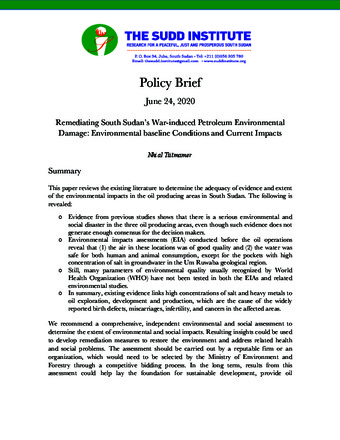Remediating South Sudan’s War-induced Petroleum Environmental Damage: Environmental baseline Conditions and Current Impacts
Publication Summary
This paper reviews the existing literature to determine the adequacy of evidence and extent of the environmental impacts in the oil producing areas in South Sudan. The following is revealed:
- Evidence from previous studies shows that there is a serious environmental and social disaster in the three oil producing areas, even though such evidence does not generate enough consensus for the decision makers.
- Environmental impacts assessments (EIA) conducted before the oil operations reveal that (1) the air in these locations was of good quality and (2) the water was safe for both human and animal consumption, except for the pockets with high concentration of salt in groundwater in the Um Ruwaba geological region.
- Still, many parameters of environmental quality usually recognized by World Health Organization (WHO) have not been tested in both the EIAs and related environmental studies.
- In summary, existing evidence links high concentrations of salt and heavy metals to oil exploration, development and production, which are the cause of the widely reported birth defects, miscarriages, infertility, and cancers in the affected areas.
We recommend a comprehensive, independent environmental and social assessment to determine the extent of environmental and social impacts. Resulting insights could be used to develop remediation measures to restore the environment and address related health and social problems. The assessment should be carried out by a reputable firm or an organization, which would need to be selected by the Ministry of Environment and Forestry through a competitive bidding process. In the long term, results from this assessment could help lay the foundation for sustainable development, provide oil companies with new social license to operate, avert potential conflict and ecological disasters, and aid in building a lasting peace in the country.
Nhial Tiitmamer has served as the Director of the Environment and Natural Resources Program at The Sudd Institute where he is currently on leave to work with United Nations in South Sudan (UNMISS). He has served as an Adjunct Assistant Professor at the University of Juba where he has taught Environmental Economics, Natural Resources Economics and Environmental Sociology. Between November 2021 and November 2022, Nhial worked as Senior Environment Associate with the United Nations High Commissioner for Refugees (UNHCR) in Juba. Before returning from Canada in 2013, Nhial worked at Arletta Environmental Consulting in Calgary and at University of Alberta’s Augustana Campus in Camrose in Alberta, Canada. Nhial’s research focusses on natural resources governance, environmental protection, climate change, and sustainable energy. He was awarded in May 2023 by the Board of Directors of The Sudd Institute with Research Impact Award for policy impacts. Nhial holds a B.A. in Environmental Studies with a minor in English Literature from the University of Alberta and an M.Sc. in Sustainable Energy Development from the University of Calgary in Alberta, Canada.

